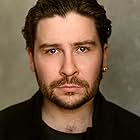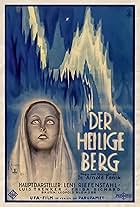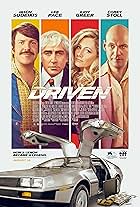Durante las negociaciones de paz en Irlanda del Norte en 2006, el líder de Sinn Féin, Martin McGuinness, y el líder del Partido Unionista Democrático, Ian Paisley, se ven obligados a viajar ... Leer todoDurante las negociaciones de paz en Irlanda del Norte en 2006, el líder de Sinn Féin, Martin McGuinness, y el líder del Partido Unionista Democrático, Ian Paisley, se ven obligados a viajar juntos en coche.Durante las negociaciones de paz en Irlanda del Norte en 2006, el líder de Sinn Féin, Martin McGuinness, y el líder del Partido Unionista Democrático, Ian Paisley, se ven obligados a viajar juntos en coche.
- Premios
- 2 premios y 2 nominaciones en total
- Reporter
- (as Lucy Cray Miller)
- Sinn Fein Security
- (sin acreditar)
- Surveillance Operator
- (sin acreditar)
Reseñas destacadas
Timothy Spall plays Reverend Ian Paisley, leader of the Unionists and an anti-Catholic evangelical minister. Colm Meaney plays Martin McGuinness, the rebellious former IRA leader ("allegedly", he clarifies) who leads the Irish Republicans (Sinn Fein). These two extremists have been at war for most of their lives, yet had never met until circumstances brought them together for negotiations.
One's take on the film will likely be determined by the level of need for historical accuracy and any personal connection to long-lasting war in Northern Ireland. Either of these traits will likely have you scoffing at the backseat verbal sparring and the plot contrivances that allow the two mortal enemies to slowly break down the ideological barriers. On the other hand, it can be viewed as a mis-matched buddy movie featuring a game of witty one-upmanship with political and historical relevance.
Either way, the dueling actors are a pleasure to watch. Mr. Spall surely has the more theatrical role, and he revels in the buttoned-up judgmental nature of Paisley – a man loyal enough to be attending his 50th wedding anniversary party, and sufficiently devoted to his beliefs that his last visit to a movie theatre was in 1973 as he led the protests against The Exorcist. In contrast, Mr. Meaney plays McGuinness as both determined to find common ground and worn down by the years of fighting and lack of progress.
Toby Stephens plays Prime Minister Tony Blair, while Freddie Highmore is the young driver charged with surreptitiously igniting conversation between the two rivals. He is fed instructions through his ear-piece by an MI5 director played by John Hurt, in one of his final film appearances. Unfortunately, this bit of "narration" came across as condescending to this viewer who surely could have done without such elementary guidance. Still, the sight of Mr. Hurt on film is always welcome.
The infusion of humor is nearly non-stop. There's a comical exchange about Samuel L. Jackson, a joke about the Titanic, and a Paisley diatribe at a gas station over a declined credit card that would easily fit in most any Hollywood buddy flick. However, these elements undermine one of the early on screen interviews we see when a citizen states bombs going off as you walk down the street is "part of life". "You can almost taste the hatred" is a great line, but unfortunately doesn't match the script of what we witness on screen. The two men re-hash some key events such as 1972's Bloody Sunday, and it's these moments that remind us just how important this new agreement was to the country. It's understandable (and relevant today) how 40 years of hate can become a way of life and difficult to end, and it also shows us just how far actual communication can go in finding common ground between folks even The Chuckles Brothers.
In a situation like this, a movie will rise or fall depending on the acting abilities of the two leads. No problem here, because director Hamm had two brilliant actors to work with: Colm Meaney as Martin McGuinness and Timothy Spall as Ian Paisley. I think it's worth seeing the movie just to watch them act.
For me, this was an extraordinary movie. I don't know enough about the history of Northern Ireland to know how accurate or realistic the dialog was. I know enough about movies to know that two brilliant leads can produce a magical moment if they know how to act, and how to interact. That's what happened in The Journey.
We saw this movie in Rochester's excellent Little Theatre. It will work well on the small screen. The Journey had a terrible IMDb rating of 6.2. That's the weighted average, but the median is 7.0. Most raters liked the film, and some loved it. However, a significant minority hated the movie, and gave it a rating of 1. (One of the people who rated it 1 has also written a review, and I suggest you check it out.)
I noticed the same rating situation with the film Selma, although the average rating was much higher. I think that probably many films about controversial subjects will have people who hate those movies. In those cases, I check the median rating, which I believe gives a more accurate reflection of what most people thought about the movie.
In my opinion, this is a definitely a film worth seeing, and I recommend it.
I've always loved movies like this where there are minimal characters in a minimal setting. Most often it's a play that has been transposed to film... I don't know if this ever was a play, but it would transfer well to the stage.
I was in school (west coast of North America) during the 70s so Ireland was prominent in the news, and we covered it in current affairs, but like most school-taught history and history-in-the-making , it wasn't "alive" to kids on the other side of the planet. It's amazing I ever did fall in love with history! In an unrelated moment a few days ago, I discovered on Ancestry that I had some ancient Irish ancestors which I never knew about before. The last couple of days I've been online and on podcasts learning some about the history of Ireland. I've probably learned/*registered* more in the last few days than I ever knew prior. It's fortuitous that I stumbled across this movie on Netflix.
While flipping through Netflix I had gone past a bunch of things I had already seen...and completely forgotten, and I was bemoaning the quality of things available. However, *this* movie I will never forget, and I'm so glad I decided to watch it! I just finished it and I will take some quiet time to think on it some more, as well as both the folly and miracles of flawed humankind.
A beautiful movie, brilliantly constructed. And yes, I was choked up at the end.
The "two" are Ian Paisley (Timothy Spall), the leader of the Northern Ireland Democratic Unionist Party, and Martin McGuiness (Colm Meaney), Sinn Fein politician and IRA operative, traveling together in a fictional hour of two-handed politics, whose interaction had the outcome of peace. The Journey, meticulously directed by Nick Hamm, is superb filmmaking that illuminates history and showcases transcendent acting.
Facing off each other with Paisley's accurate condemnation of IRA violence and McGuiness's hatred of Paisley's rigid evangelical Protestantism, the two in the van on the way to the Glasgow airport dance around each other as they figure out how to survive their own arrogance and win a peace. But as we know, an accord was made back then that ended 40 years of bloodshed and a unified Northern Ireland under the combined leadership of both men.
Although actors like Toby Stephens as Tony Blair and John Hurt as Harry Patterson could command any screen at any time, Spall and Meaney are so believable as to make you forget all other performances. Their job to let you see the growing friendship by small increments is marvelous to behold.
Applause, too, must be given for a production design that commands maximum intimacy and suspenseful plot distribution: The interior of the van becomes an intimate drawing room with no diplomats or functionaries to distract from the plan at hand; the brief time to get to the airport has the properties of a digital readout in a heist movie—everyone is aware that the handshake may not happen if the van gets to the plane on time or too late.
The Journey is required for those who love first-rate acting and those who want to feel history in the making. For anyone else, it is the antidote to the summer blockbuster.
This story imagines that journey. That's the opening text and it's a mistake. Essentially, it's saying that it's fictional which is fine but it doesn't need to be proclaimed on screen. It takes some of the tension right out of the movie and the ending is already known. As for the story, it has some good turns but I almost wish for a simple inside-the-car three hander. It's the actors and it would be interesting to do My Dinner with Andre in the back seat. Spall and Meaney are great. Even Highmore is fine in doing a bumbling driver. It's a compelling what-if story for the politically-minded.
¿Sabías que...?
- CuriosidadesFilmed near Larne, Northern Ireland.
- PifiasAerial shot following the MPV as it travels across the Forth Road Bridge shows the under-construction Queensferry Crossing bridge - it only began construction in 2011.
- Citas
Harry Patterson: You feel the hand of history on your shoulder?
Tony Blair: Around my throat more like. It's like looking at the promised land with the wrong end of a telescope.
- Créditos adicionalesDuring the end credits for the main cast photographs of the real Ian Paisley and Martin McGuinness at various official occasions are shown.
- ConexionesReferences Operación Dragón (1973)
- Banda sonoraAre You Getting Through
Written by Glen Hansard
Published by WB Music Corp. (ASCAP)
Performed by Glen Hansard, Joseph Doyle, Graham Hopkins, Ruth O'Mahony Brady, Michael Buckley, Ronan Dooney, Una O'Kane, Paule Hughes, Katie O'Conner, David, Odlum
Recorded fby David Odlum at Westland Studios, Dublin and Black Box Studio, France
Produced by David Odlum
Appears Courtesy of Anti Records
Selecciones populares
- How long is The Journey?Con tecnología de Alexa
Detalles
Taquilla
- Recaudación en Estados Unidos y Canadá
- 155.475 US$
- Fin de semana de estreno en EE. UU. y Canadá
- 32.895 US$
- 18 jun 2017
- Recaudación en todo el mundo
- 482.209 US$
- Duración1 hora 34 minutos
- Color
Contribuir a esta página





































